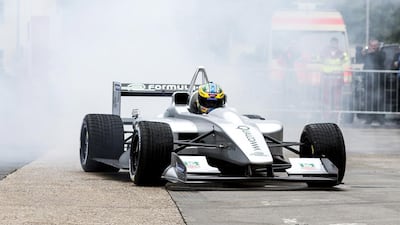Formula E, the world’s first major racing championship for electric cars, being held across 10 cities next year, is also the starting flag for a much bigger global race.
The new sport will decide which technologies will power the car industry for the rest of the century. The Ssmartphone chip-making giant Qualcomm, which is sponsoring the Formula E championship, believes that cars are soon to become more wireless-dependent than smartphones.
“We think the future of the auto industry is wireless,” says Joe Barrett, a senior director of Qualcomm Europe, who is also part of Qualcomm’s Halo project, formed to develop wireless charging technology for electric cars.
Qualcomm’s technology transmits electricity between two coils resonating at the same frequency to charge the cars while they are racing. Pads in the road transmit electricity to the cars as they go past.
“Our Halo project is concerned with recharging electric cars wirelessly. This is a technology that has yet to be properly commercialised,” says Mr Barrett. “The ultimate development of powering cars wirelessly is something called dynamic charging, which means charging cars remotely even when they are moving at speed down a highway.”
The racing car maker McLaren, which is providing the electric motor, gearbox and electronics for the Formula E cars, is also aiming for a pole position in the electric car market and has been working closely with Renault and Spark Racing Technology to develop the cars for next year’s Formula E Championship.
The motor and power electronics that McLaren is providing have been the focus of intensive research and development and testing for four years. McLaren has already completed thousands of kilometres of motor testing on its new electric technology in the lab. Before the motor is fitted to a car, it has clocked up the equivalent of two seasons of racing in testing.
McLaren’s engine will produce more than 250 continuous brake horsepower and 140 Newton meters of instant torque, while weighing just 26 kilograms.
McLaren is also providing the standard engine control units for Formula E. These effectively provide the brains inside the new breed of smart racing cars.
McLaren already uses its new electric technology to power its own commercial vehicles. The first commercial application of the technology is in the company’s P1 cars. Just 375 of the £866,000 cars (Dh5.1 million) will be made.
Every McLaren P1 has a Formula E engine. The car is not, however, fully electric and runs partially on petrol. According to McLaren, the P1 is available in the Middle East, although it may have already sold out in most markets including Asia and the United States.
The company believes that, in the future, it is most likely that the new electric engines will be used in environments such as motor sport, but that could also include aviation and defence.
Formula E’s gruelling city routes will push electric car technology to its limits and will allow Formula E’s technical partner, the French car maker Renault, to gauge the reliability and safety of the car industry’s new electric technology.
“The reason we are in Formula E is to be present in an emerging area of motor sport. We are also looking more broadly at what is happening in the general electric car market,” says Arnaud Boulanger, the motor sport director at Renault Sport Technologies.
He adds that safety is a major focus as any appearance of safety concerns during next year’s event could have major implications for the fledgling electric car industry.
Formula E is effectively blazing a trail for the sector. Although a growing number of drivers opt for hybrid vehicles and a small minority of sports car drivers have bought cars made by Tesla, Silicon Valley’s home-grown electric car maker, the global market for electric cars remains tiny.
Although Renault claims to be the world’s leading maker of electric cars, it acknowledges that, as it sells only 15,000 purely electric cars a year, the sector is still in its infancy.
“It is far too early to make accurate predictions about the future of the electric car industry but you have to be there. Renault has to be there,” says Mr Boulanger.
The Formula E races will last for about one hour each with drivers making two mandatory pit stops to change cars. Engines will be restricted to power-saving mode (180bhp) but can be temporarily increased to maximum power (270bhp). All rounds will be one-day events with practice, qualifying and the race taking place in a single day to reduce costs and minimise disruption to the host city.
Next year’s championship will run from June to September and take place in 10 cities, including Los Angeles, Berlin, Rio de Janeiro, London, Buenos Aires and Beijing.
Qualcomm is not alone in seeing the car industry as the technology industry’s next frontier. Other tech companies are not only keen to provide in-car digital communications, but also wish to be involved in the production of new generation electric vehicles.
For example, the German car parts maker Continental is reported to be forming partnerships with Google and IBM for self-driving cars.
It is this new cooperation between the motoring and IT industries that is set to revolutionise not only the world of motor racing but also eventually provide ordinary drivers with truly 21st-century rides.
business@thenational.ae

